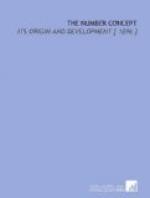CHAPTER I.
Counting.
Among the speculative questions which arise in connection with the study of arithmetic from a historical standpoint, the origin of number is one that has provoked much lively discussion, and has led to a great amount of learned research among the primitive and savage languages of the human race. A few simple considerations will, however, show that such research must necessarily leave this question entirely unsettled, and will indicate clearly that it is, from the very nature of things, a question to which no definite and final answer can be given.
Among the barbarous tribes whose languages have been studied, even in a most cursory manner, none have ever been discovered which did not show some familiarity with the number concept. The knowledge thus indicated has often proved to be most limited; not extending beyond the numbers 1 and 2, or 1, 2, and 3. Examples of this poverty of number knowledge are found among the forest tribes of Brazil, the native races of Australia and elsewhere, and they are considered in some detail in the next chapter. At first thought it seems quite inconceivable that any human being should be destitute of the power of counting beyond 2. But such is the case; and in a few instances languages have been found to be absolutely destitute of pure numeral words. The Chiquitos of Bolivia had no real numerals whatever,[1] but expressed their idea for “one” by the word etama, meaning alone. The Tacanas of the same country have no numerals except those borrowed from Spanish, or from Aymara or Peno, languages with which they have long been in contact.[2] A few other South American languages are almost equally destitute of numeral words. But even here, rudimentary as the number sense undoubtedly is, it is not wholly lacking; and some indirect expression, or some form of circumlocution, shows a conception of the difference between one and two, or at least, between one and many.
These facts must of necessity deter the mathematician from seeking to push his investigation too far back toward the very origin of number. Philosophers have endeavoured to establish certain propositions concerning this subject, but, as might have been expected, have failed to reach any common ground of agreement. Whewell has maintained that “such propositions as that two and three make five are necessary truths, containing in them an element of certainty beyond that which mere experience can give.” Mill, on the other hand, argues that any such statement merely expresses a truth derived from early and constant experience; and in this view he is heartily supported by Tylor.[3] But why this question should provoke controversy, it is difficult for the mathematician to understand. Either view would seem to be correct, according to the standpoint from which the question is approached. We know of no language in which the suggestion of number




